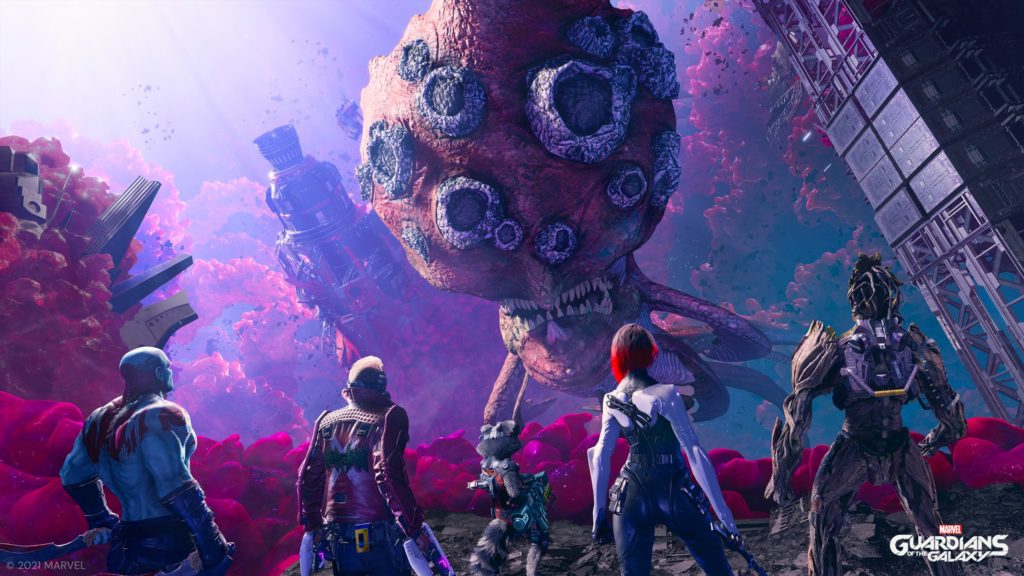The first Guardians of the Galaxy game nails the ethos of the quirky franchise and provides some fun and distinctive gameplay to boot.
Of all the Marvel franchises that span comic-books and movies, Guardians of the Galaxy arguably possesses the most distinctive personality – and personalities, with its chronicling of the misadventures of a crew consisting of one human stuck in a 1980s rut and four exotic aliens.
Bearing that in mind, the omens for Square Enix’s first stab at turning the franchise into a videogame didn’t look great. At least, that was the case if you considered the evidence offered by the Anglo-Japanese publisher’s previous effort along those lines, Marvel’s Avengers. Marvel’s Avengers was a bland, loot-box-fixated mish-mash that signally failed to demonstrate even a hint of personality.
But whereas that game was developed by Crystal Dynamics, Eidos Montreal took the reins of Guardians of the Galaxy, and opted for a polar-opposite approach: Guardians of the Galaxy is a single-player, more or less single-path game. And from the moment you boot it up, you get the feeling that it was made by a team of rabid Guardians of the Galaxy fans, revelling in their chance to do justice to the franchise.

It has all the unique personality that Marvel’s Avengers lacked, along with a commendably distinctive feel which bodes well for the prospect of future Guardians of the Galaxy games. Gameplay-wise, it’s mainly about combat, with Peter Quill taking on waves of enemies, mini-bosses and bosses with both blaster and melee attacks, while directing Gamora, Drax, Groot and Rocket, who have a diverse range of special attacks that damage enemies in different ways.
There are also environmental attacks that can be triggered – Drax, for example, can chuck exploding barrels at enemies, causing particular damage to shields if they hit. As the game progresses, the Guardians acquire more special attacks – Groot can hold enemies in place and resurrect downed Guardians, Rocket has a variety of bomb attacks, and Gamora and Drax have powerful melee attacks, while Quill has a diverse set including temporary invulnerability, an ice-bomb which causes damage beneath him as he jumps and a period of continuous rapid-fire.
Given both the amount and the varying abilities of the enemies you face, it soon becomes apparent that you need to take a tactical approach, eliminating certain enemies before taking on the rest, and it can take a while before you realise which Guardians can cause the most damage to specific enemies. And the boss-battles are deeply memorable and satisfyingly challenging.
Varying the gameplay
But along with the combat, there are elements of puzzle-solving, often using specific Guardians’ abilities – Groot can build wood-bridges, Rocket can crawl into tiny spaces and hack things, Gamora can slash objects obscuring pathways and cling onto rockfaces to boost Quill to higher ground and Drax can smash through weakened surfaces and move heavy objects around. Plus there are platform-style sequences, a few tastes of space-shooting and many instances in which Quill must negotiate conversation-trees. The latter are a tiny bit reminiscent of Mass Effect, as is the combat, even though there’s no need (or opportunity) to use cover in Guardians of the Galaxy’s epic fights.
Story-wise, Guardians of the Galaxy is impeccable and very much on the same wavelength as the films, with the motely crew lurching merrily between improbable and outlandish situations; naturally, they end up being the only ones who can avert an existential threat facing the entire galaxy, a quest they pursue in the most farcical manner possible.
An impeccable storyline
The story is peppered with various flashbacks, usually exploring Peter Quill’s last days on Earth as a teenager before he was plunged into a peripatetic galactic existence, and fantasy scenes. All through the game, even when the Guardians are merely traversing levels, they maintain a constant banter, and various much-loved franchise characters feature, such as Cosmo the Russian space-dog, Mantis and Adam Warlock, along with nicely observed new ones such as the fearsome Lady Hellbender and Cammy the purple llama.

Proceedings begin with our heroes scavenging in the Quarantine Zone, inadvertently triggering a chain of events that will lead to potential galactic apocalypse. Before long, the galactic space-cops of Nova Corps have caught up with them, bringing Quill back into contact with his old flame Ko-Rel and leaving them with a fine that, naturally, leads to them hatching the riskiest money-making plan. As they attempt to pay their fine, they start to discover the jeopardy into which the galaxy has been plunged.
Top-notch production values
It all develops into a roller-coaster of a story which would be way too long to exist within the confines of a single film – happily, with a prologue and 16 chapters, Guardians of the Galaxy bucks a vexing modern trend by having plenty of meat to it – between 20 and 25 hours of gameplay. Sadly, though, it has virtually nothing by way of replay value – completists can avail themselves of a New Game Plus mode, but only one chapter – the one set on the mining colony of Knowhere – contains any side-missions and mini-games, and they are pretty perfunctory.
Which is a shame, since Guardians of the Galaxy leaves you gagging for more. Not only is it fun to play, but thanks to absolutely sky-high production values – a pitch-perfect script, great character design and animations, great level design and spot-on virtual acting – it immerses you magnificently in the Guardians’ peculiar but seductive universe (OK, galaxy, technically).
In other words, it feels like a game made by fans — and very talented ones – for fans, which is pretty much all we could have asked for, and goes some way towards exorcising the memory of Marvel’s Avengers. It’s a shame that once it’s done, it’s done – but let’s hope that Square Enix and Eidos Montreal have a ton of downloadable content planned for it.
